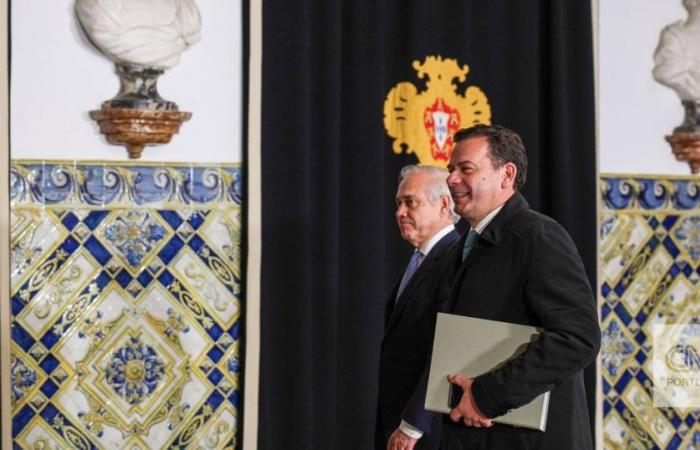In the Government that takes office today there are two portfolios that concern those who know the party well. They are both led by women. Work and Health. Pacheco Pereira warns that they can be “a problem” when negotiating with the PS. Because these two new ministers, say those who followed their journey, put “results” first
“Some people in the new Government are very right-wing, it will be a problem”. The warning was left by José Pacheco Pereira. And the “problem”, he explains, will be at the time of possible negotiations with the PS. Let’s go. First It is necessary to understand who, in the executive that takes office today, is “very to the right”.
On CNN Portugal, Pacheco Pereira gets straight to the point. It is in the “Work and Health” portfolios that he says he finds this inclination. The protagonists, two women: Maria do Rosário Palma Ramalho and Ana Paula Martins, respectively.
The commentator and PSD activist, although one of the most critical voices of the party in recent years, advises looking for “interviews and academic work” to understand the reasons.
“If there are no agreements with Chega, they must be made with the PS. Or there are ministers who do not do what they have written, said and proposed so far. Or there is a clash with the PS”, he reiterates.
“Results” first
This position of Pacheco Pereira is shared by political scientist José Filipe Pinto, researcher of the forces on the right. But for the specialist, the biggest “problem”, or rather, “the biggest headache” will not be in the Labor and Health portfolios but in those where there are “agglutinations”: Agriculture and Fisheries; Education and Higher Education; Infrastructure and Housing. “No matter how many State secretariats are created, they are not as important as the Ministry”, he warns.
But when the analysis moves from the organic to the personalities at the head of each tutelage, José Filipe Pinto also points out the names of Maria do Rosário Palma Ramalho and Ana Paula Martins as those “further to the right”.
Taking into account the path and positions publicly assumed by both, “they measure policies by results, more than by principles”, points out the analyst.
According to José Filipe Pinto, these two ministers could “be accused of some authoritarianism”, especially by the left, whose orientation towards these two ministries could “generate antibodies with the PS”, since “these are measures with great human cost”.
In short: “There is a way of managing and defining the strategy that distances them from the PS, because they favor the ethics of responsibility over the ethics of conviction.”
“Dirigista stance” at Work: and criticism of socialist changes to the law
The Left Bloc, in the voice of the new parliamentary leader, Fabien Figueiredo, defined the new Minister of Labor, Maria do Rosário Palma Ramalho, as “an academic against labor rights”. And several unions expressed fears in this regard.
“He has a dirigiste stance”, says José Filipe Pinto. He enters the new government with the goal of simplifying the current Labor Code. In recent times, the future governor has focused her criticism on the teleworking legislation approved by the PS in times of pandemic.
He has already defended a more flexible fixed-term contracting regime and criticized the lack of representation in current collective contracting. And you’ve already seen a text of yours, justifying that economic reasons can motivate dismissal, giving strength to a dismissal in banking.
Regarding the right to disconnect, one of the hottest topics in the job market, he responded like this: “We don’t need to regulate it, but we need to get used to it, as workers, not answering the phone”.
Positions that separate this Labor Law professor from the path taken by the PS over the last few years and that could dictate arms, in case of need for consensus, from now on.
(Lusa)
“Negotiating toughness” in Health: and the confrontation with the PS model
“We noticed that, in the attitude she has as a manager, there is some negotiating toughness”. José Filipe Pinto describes Ana Paula Martins, the next Minister of Health, as follows. And he highlights that the woman, chosen by the executive director of the SNS, Fernando Araújo, will now change the game.
“The Government of António Costa was always adrift in the Health dossier and needed people with a strong pulse”, like Ana Paula Martins, a long-time social democrat.
His time as president of the Board of Directors of Centro Hospitalar Universitário Lisboa Norte, which included the largest hospital in the country, Santa Maria, was short. One year in office.
She slammed the door, “after deep personal reflection”, because she disagreed with the new organizational model of the SNS, with the creation of Local Health Units, as has been defended by the PS and the man who chose her for this same position.
And, even though Ana Paula Martins is known for her desire for consensus, this issue could cause controversy in eventual negotiations with the socialists, who defend tooth and nail the changes carried out in the organization of the SNS.
“It has an ethic of responsibility, of results”, insists José Filipe Pinto. Ana Paula Martins has argued that public hospital managers must know how to do the same as those in private hospitals. She welcomes the return of public-private partnerships and contracts with the social sector.
“The reports show that these PPPs in health were overall very positive”, he stated about the area of continued care. It is pragmatic: what “needs to be corrected will be corrected”, what “is working well is to continue”.

(Lusa)
The inevitable reference to Nuno Melo
José Pacheco Pereira and José Filipe Pinto agree that this is not the most right-wing government ever. This title goes to Pedro Passos Coelho’s executive. “The Passos Coelho Government changed the PSD, removed the PSD from its social democratic tradition”, summarizes Pacheco Pereira.
But in this Luís Montenegro executive, they say, there is one more name that proves this inclination to the right: Nuno Melo, who is in Defense. It is the ideology of the party he leads, the more conservative CDS-PP, that ends up being referenced.
Pacheco Pereira believes that Melo “will not” be respected by military hierarchies. José Filipe Pinto agrees: “With Nuno Melo, and at a time when security is at stake, I’m not sure if the military leaders will recognize the authority he needs”. Especially at a time when the possibility of compulsory military service is once again being discussed.
Tags: rightwing governed results principles ministers create problems Montenegro
--







